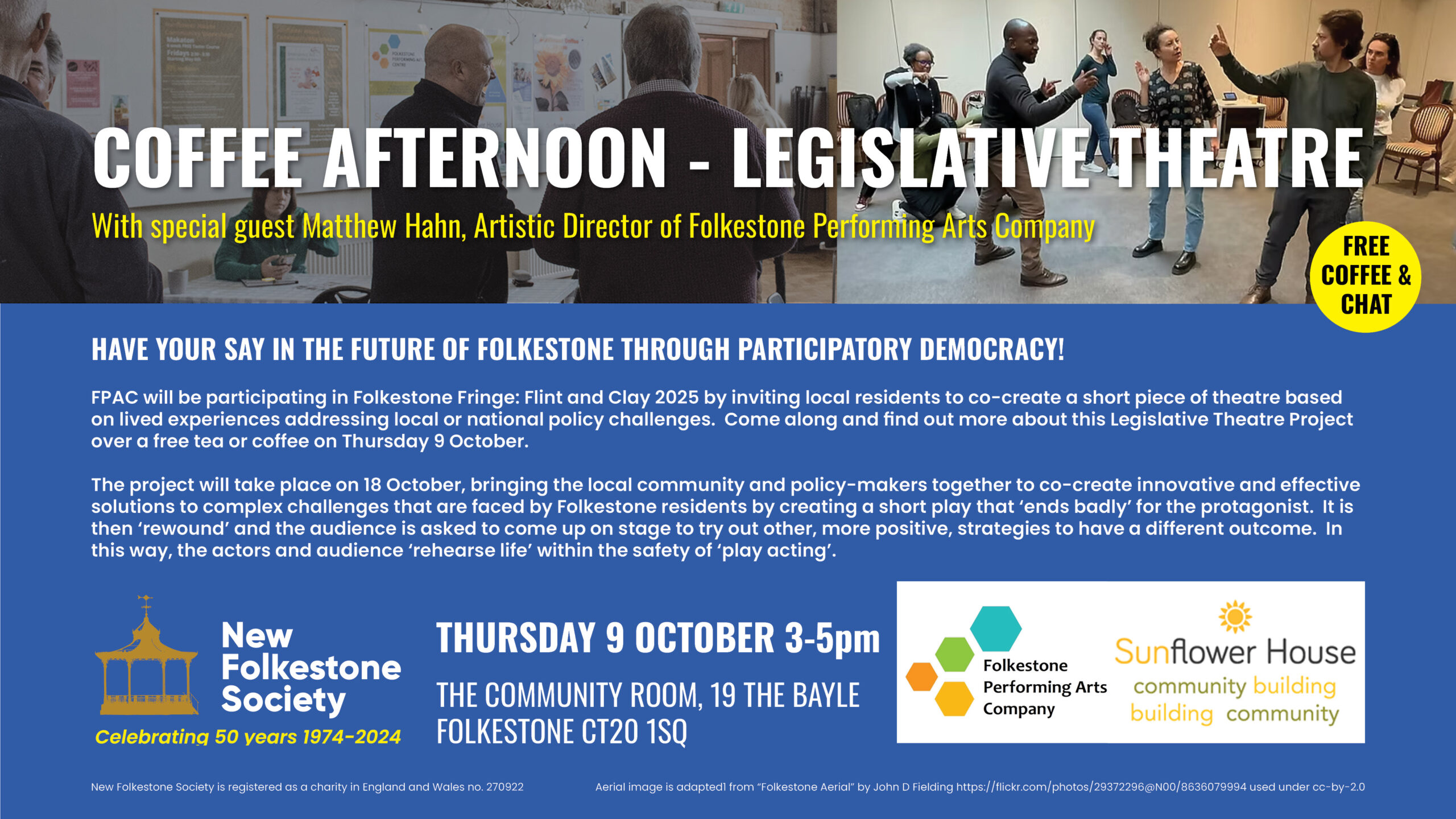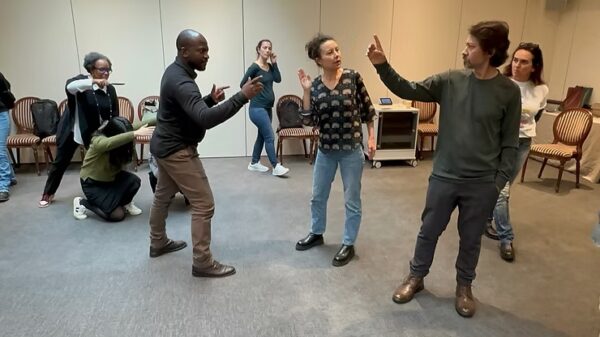
Coffee Afternoon & ‘Folkestone’s Future’ Legislative Theatre

Free coffee afternoon with an introduction to a Legislative Theatre Project by Matthew Hahn of FPAC.
There will be an informal talk at 3.15pm on the project by Matthew Hahn. However, you can join our drop-in session at The Community Room on The Bayle for free refreshments at any time between 3 – 5 pm and find out more about the Folkestone Performing Arts Company.
Please note the Coffee Afternoon is on Thursday 9 October in The Community Room. The Legislative Theatre Project takes place on Saturday 18 October in Sunflower House.
If you would like to register your interest in FPAC’s Legislative Theatre Project, see the event page on the Folkestone Fringe website for details or e-mail [email protected]. (You do not need to register for the Coffee Afternoon – just turn up!)
ABOUT THE THEME & GUEST

The Folkestone Performing Arts Company is thrilled to announce that they will be participating in the FOLKESTONE FRINGE: FLINT & CLAY 2025.
On the 18th of October, FPAC and local residents will co-create a short piece of theatre based on lived experiences addressing local or national policy challenges. At 5pm, they will perform this play in front of an audience of key policy makers, business owners, political leaders and others with the hope of legislating systemic change within the community.
The Folkestone Performing Arts Company’s Legislative Theatre Project will bring the local community & and policy-makers together to co-create innovative and effective solutions to complex challenges that are faced by Folkestone residents.
In it, a short play is created which ‘ends badly’ for the protagonist or main character. The play is then ‘rewound’ and the audience is asked to come up on stage to try out other, more positive, strategies to have a different outcome. In this way, the actors and the audience ‘rehearse life’ within the safety of ‘play acting’.
ABOUT LEGISLATIVE THEATRE
A Theory of Change is a method that explains how a given intervention, or set of interventions, can lead to a specific developmental change. Theatre can be a powerful tool in enacting such a theory by supporting systemic change and / or policy development. This can be demonstrated by the interactive ‘Legislative Theatre’ process: Legislative Theatre opens the possibility for change to be catalysed and creates a platform for the advocacy of rights.
Working beyond issue awareness and community building, Legislative Theatre allows the participants to address the obstacles or oppressions they face to key policymakers in the audience who then interact with the play with the hope that these policymakers will then legislate systemic change in the community. This form uses participatory and interactive theatre techniques to examine communication breakdown and power imbalance.
HOW DOES IT WORK?
Create: Community members create an original play based on lived experiences, addressing local or national policy challenges: Our communities face big challenges — climate change, social exclusion, declining trust in public institutions, etc. Meaningful public participation can help governments address these challenges.
Perform: Community members perform their original play to audience members who can make systemic change and those who have lived experience of the presented challenges.
Act: Audience members step onstage as the ‘protagonist’ in the play to improvise potential alternatives to the problems presented, testing new rules and policies in real time. The community actors become ‘antagonists’ gently pushing back on any alternatives that are suggested by audience members.
Propose: Audiences, advocates and policy-makers collaboratively shape these alternative ideas into specific policy proposals, followed by deliberation, debate, and amendments to embed systemic change.
Vote: Everyone present votes on the proposals – using theatre to spark concrete change.
Commit: Policymakers and advocates make commitments to action based on the proposals.
Through this participatory policymaking, community members propose, debate, and vote on new policies and policy changes. You can find further information about Legislative Theatre here.
Some material adapted & developed from The People Act Legislative Theatre Resources [www.thepeopleact.org/resources]
ABOUT THE GUEST
You may remember our friends at the Folkestone Performing Arts Company (FPAC) from their preview of a dramatisation of The Leech of Folkestone from The Ingoldsby Legends or their involvement in our Community 50/50 event at the beginning of the year.
FPAC is an artist-led international theatre company creating vibrant, relevant and compelling theatre through the celebration of local stories.
Alongside a professional Ensemble, theu also support developing artists through Community Acting Group and Writing for Performance sessions.
FPAC also offers a range of workshops for schools through their professional ensemble.
Artistic Director Matthew Hahn, who will be facilitating the workshop, has over 20 years of experience as a theatre for development practitioner in working with communities in struggle, he has co-created interactive and participatory international theatre projects focusing on developing and enabling young people, social cohesion, peace-making and conflict resolution in the Global South & North.
ABOUT THE VENUE
The Community Room is located at 19 The Bayle, where Dance Easy used to stand, in an attractive Georgian-style townhouse. It is run by the Sunflower House team on a partnership model, where local groups and organisations offering community benefits with similar values are able to utilise the space.
TRAVEL TO THE VENUE
By Bus:
The venue is about a 600 metre walk (one-third of a mile) from the temporary bus station. Head through Bouverie Place shopping centre and down West Cliff Gardens (between the HSBC and Lloyds banks) and straight through the churchyard, turning left when you get to the British Lion pub. The room is opposite the Bayle Pond.
For step-free access avoiding cobblestones, go down the pedestrian precinct to the Town Hall and turn right onto Church Street. Follow that to the end (past the school), turn left and veer left as above.
By Car:
The nearest Pay and Display car park is Upper Payers Park, accessed from Dover Road (passing the F51 skate park) next to the amusements where the Banksy was located originally. Walk to the end of Payers Park, turn right onto the Old High Street and walk up to the top. Turn left, then take the first right. The building will be on your right after the Glendale building.
For step-free access avoiding cobblestones, walk out to Dover Road and turn left. Walk around the amusements building to the front, carry on down Rendezvous Street, cross the road and turn left at the gate (onto what is still Rendezvous Street). Walk to the top, turn left onto Church Street, follow it to the end (past the school), turn left onto The Bayle and follow the road, which veers left. The room is on the left, opposite the Bayle Pond.
